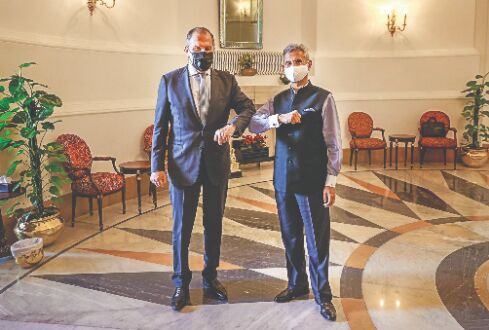India, Russia discuss defence ties

New Delhi: Russia on Tuesday promised joint production of weapons systems in India as the two countries held extensive talks covering key areas of bilateral cooperation as well as pressing issues like the Afghan peace process and each other's outlook on the Indo-Pacific region.
In the talks between External Affairs Minister S Jaishankar and his Russian counterpart Sergey Lavrov, the Indian side apprised the Russian delegation of its views on China in the backdrop of the border row in Ladakh, people familiar with the matter said.
At a press conference with Lavrov, Jaishankar, describing the talks as "very warm", "comprehensive" and "very productive", said much of the discussions covered the preparations for President Vladimir Putin's visit to India for the annual India-Russia summit later this year.
To a question, Lavrov dismissed the possibility of any future military alliance between Russia and China and asserted that the cooperation between the two countries was not directed against anyone.
Referring to bilateral defence ties, Lavrov said Russia was ready for transfer of cutting edge technologies and production of weapons systems in India. "I am sure deepening of military cooperation serves national interests of both the countries. At the same time, we respect the right of the Indian friends to diversify ties in this area," he said, while describing the outcome of the talks as "satisfactory".
Without elaborating, Jaishankar said, "Our defence sector requirements in the past year were expeditiously addressed."
The Russian foreign minister arrived here on Monday evening on a nearly 19-hour visit amid apparent unease in Moscow over the proactive approach of the Quad member nations, including India, in dealing with geo-political developments in the Indo-Pacific region.
Lavrov is travelling to Islamabad from India On Tuesday evening.
"Of course none of you would be surprised to learn that the discussions were very warm, they were comprehensive and they were very productive," Jaishankar said in his media statement.
He said both the countries understand the importance of the India-Russia relationship to global peace, security and stability and that the review of the bilateral ties was "really encouraging".
"I shared our view-point on the Indo-Pacific. As our prime minister pointed out at the Shangri-La Dialogue some years ago, contemporary challenges require countries to work together in new and different ways," Jaishankar said.
"Such cooperation also reflects the multi-polar and rebalanced character of global politics. India is strongly committed to ASEAN centrality and this is underlined by the Indo-Pacific Oceans Initiative (IPOI) that it has been advocating at the East-Asia summit," he added.
The 10-nation grouping of Association of Southeast Asian Nations (ASEAN) is a key stakeholder in the Indo-Pacific region. Russia has been critical of the Quad grouping that has been aimed at ensuring a free and open Indo-Pacific against the backdrop of China's growing assertiveness in the region. Quad comprises India, the US, Japan and Australia.
The Russian foreign minister referred to the Indo-Pacific as Asia-Pacific and said both sides highlighted the need to preserve the central role of ASEAN in the region.
He also highlighted the need for interaction among Russia, India and China under the existing trilateral framework.
In the press conference, Lavrov dismissed suggestions of any future military alliance between Russia and China.
"By the way, we have heard speculation about pro-military alliances not only with respect to Russia and China relations, we have also heard about such alliances allegedly being promoted such as Middle East-NATO, Asia-NATO. Today we exchanged views on this and our Indian friends have the same position as we. We believe this is counter-productive," he said in Russian.
"We are interested in inclusive cooperation that is for something, not against somebody," Lavrov said.
Jaishankar said some time was spent on discussing developments in and around Afghanistan.
"For India, what happens in Afghanistan impacts its security directly. I shared our approach that a durable peace there would require harmonising interests of all, both within and around that country," he said.



